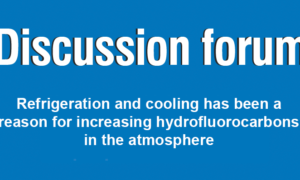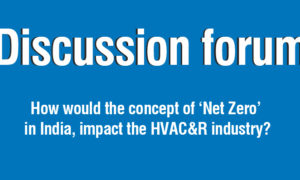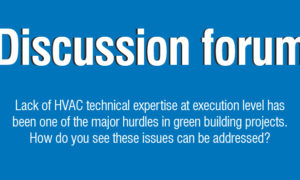Sangita Jhangiani, Consulting Engineer, Founder, Enova and President, Mumbai Chapter, ISHRAE

Well, it does! So there are lot of things. For example, the cell phone has so much of radiation that’s not good for our health, but that does not mean that we will stop using it. Lot of research is being done on refrigerants so that we can reduce the impact on the environment and come up with environment-friendly ones.
Refrigerants should have low Ozone Depletion Potential (ODP) and it should have the least Global Warming Potential (GWP). Unfortunately, a refrigerant which is low in ODP is high in GWP. Even ISHRAE has taken up research on topics pertaining to refrigerants.
We, at ISHRAE, are taking steps to reach out to builders to come up with ‘green’ buildings so that the thermal load on a building is reduced; so, here, the concept of net-zero and recyclable energy is coming to play. Even the industries are now looking at products such as solar air conditioning, desiccant air refrigerant and adiabatic cooling.
Aayush Jha, CEO, Clairco

On an average, 75-80 per cent of electricity consumped in a building is because of HVAC; that’s a lot of energy being consumed by one particular category. This’s not a smart move. There are a lot of energy efficiency companies that have come up with sensor-based technologies, which is completely data driven to reduce power consumption by 40 per cent. There is high need for property owners and building owners to use these kind of energy efficient technologies. Until that, HVAC will continue consuming power on a large scale.
HVAC OEMs should start licensing or buy from such technology providers and inculcate that technology in their own air-conditioning systems. I think this alignment needs to be done. Maybe in the next five years, companies will start using these technologies to make their HVAC systems much more efficient.
Kulwant Singh, Entrepreneur and Founder of Kleanwave Solutions

HVAC&R is no longer a luxury, it is one of the basic necessity of life. The HVAC&R market will continue to expand, although its impact on environment is huge. Despite adopting various energy efficient systems, still the issue is not resolved. It needs to be addressed.
We are now dependent on this market for medical to agricultural needs. More than 90 per cent of refrigeration equipment relies on vapour compression using refrigerants and this figure will not change in the near future. Other technologies do not generally have enough efficiency. Chlorinated CFCs, HCFCs and HFCs contribute to the depletion of stratospheric ozone if released into the atmosphere due to equipment leaks or if refrigerants are not properly recovered during the disposal of the equipment. Current measurements of the ozone layer show overall stability and probable recovery to the previous level around 2060. They are often replaced HFCs, which do not deplete the ozone layer, but are potent greenhouse gases, as are HCFCs. CFCs are also greenhouse gases and their global warming potential was much higher.
However, the environmental issues provide an opportunity to OEMs and young entrepreneurs to design new equipment using renewable as energy sources and using technologies with good energy efficiency.
Aditya Mittal, COO, Mittal Refrigeration

Yes! As per my knowledge and thinking, HVAC&R industry is a major contributor to ozone depletion and global warming.
New and alternative environment friendly refrigerants are coming to the market. At this moment, the basic principle of air conditioning and refrigeration cycle remains the same even in developed countries. You cannot change that. A totally new technology bypassing the air conditioning cyclehas not yet happened. But yes, new alternative refrigerants have come out. When you charge these refrigerants in your air-conditioners, even if these refrigerants go out in the atmosphere they cause much less harm to our climate, almost negligible than the ones which are currently used. So, with the coming of new refrigerants, new compressors are required, new and more robust air-conditioners are required, which turns out to be very expensive in the market.
The customer awareness is not much. As a buyer, nobody thinks about the climate before buying an air-conditioner whether they should go for an air-conditioner with a new refrigerant or the one which will cause no harm to the environment. People are not aware about it or else they would go with environment-friendly refrigerants and actually do their bit for the climate.
Cookie Consent
We use cookies to personalize your experience. By continuing to visit this website you agree to our Terms & Conditions, Privacy Policy and Cookie Policy.















